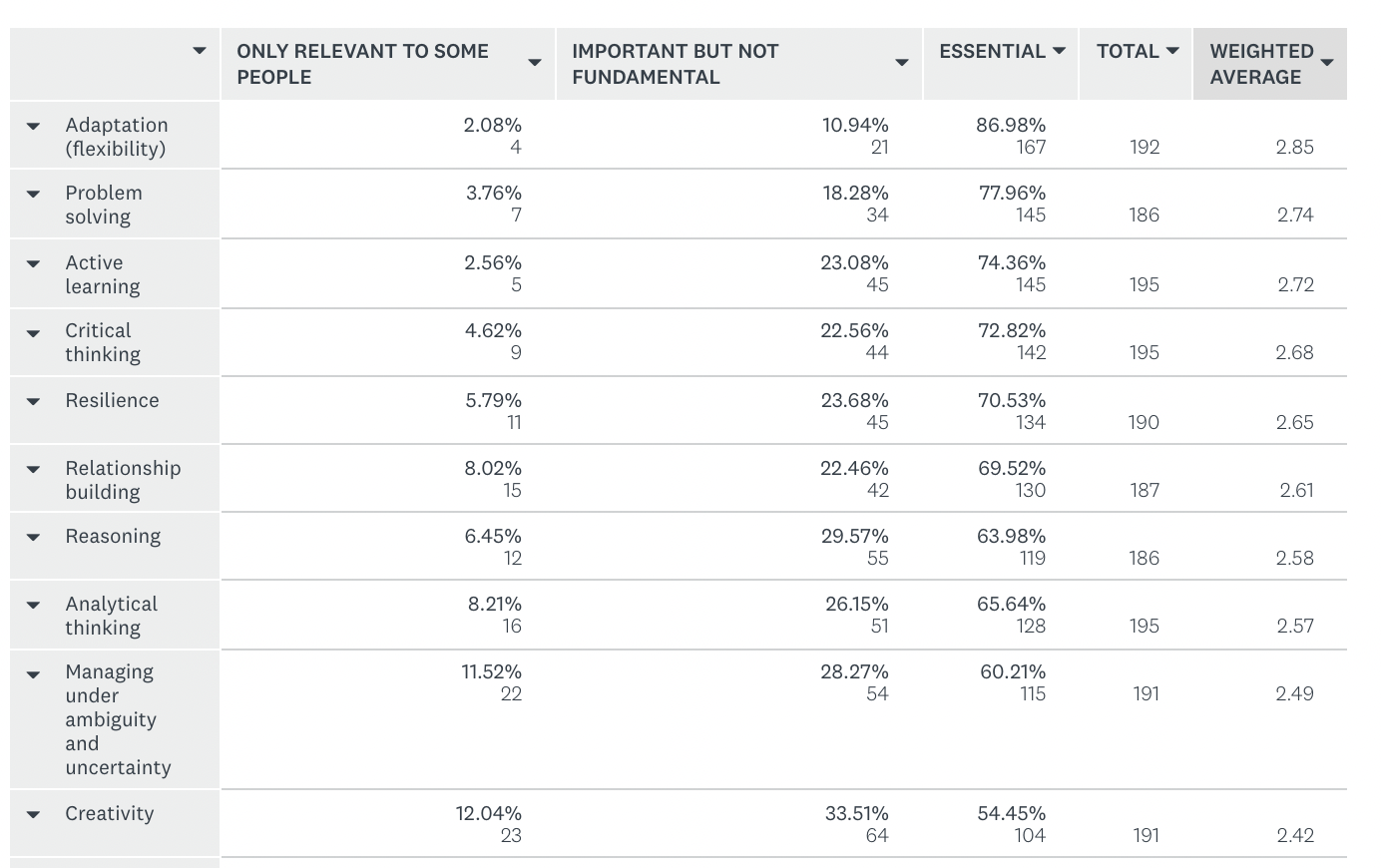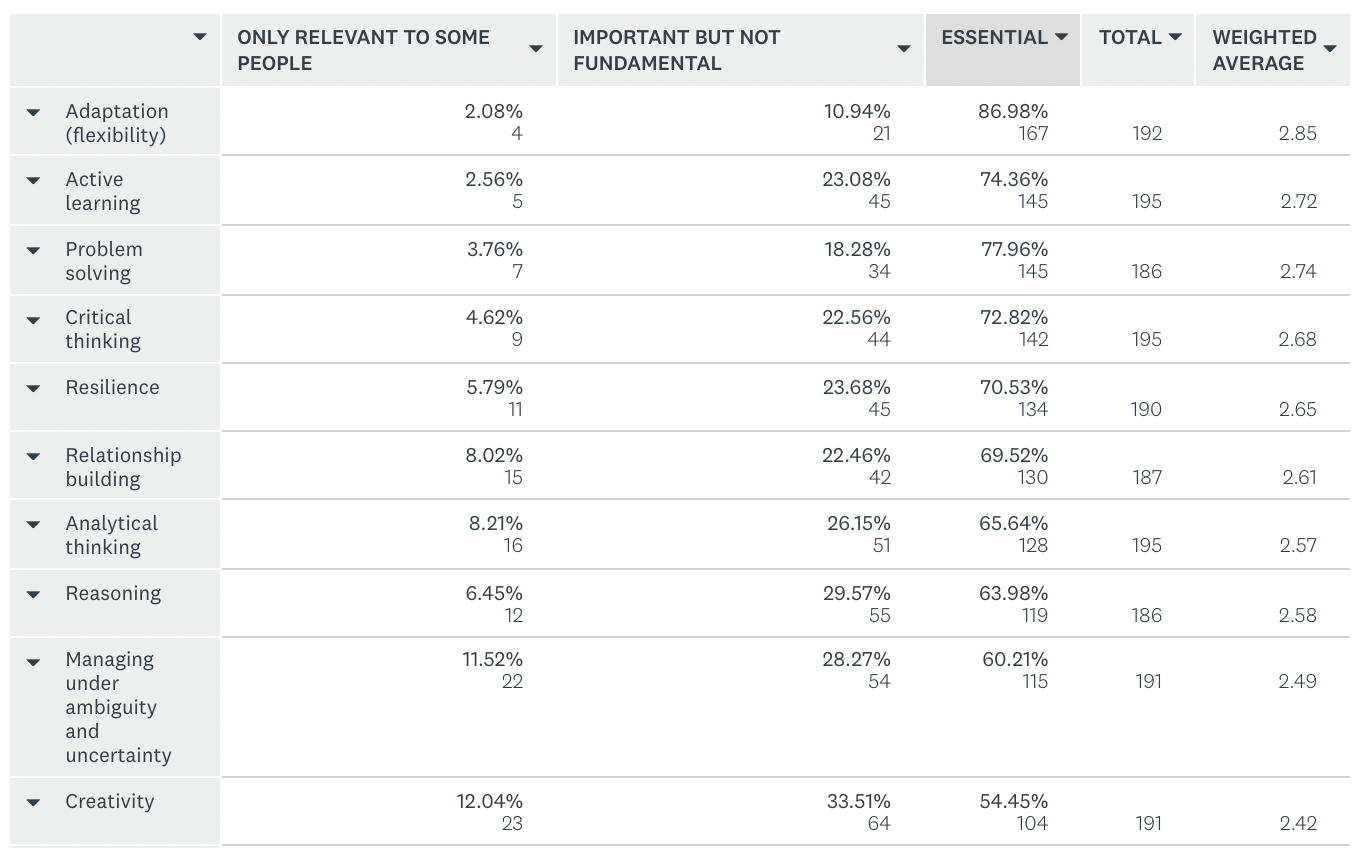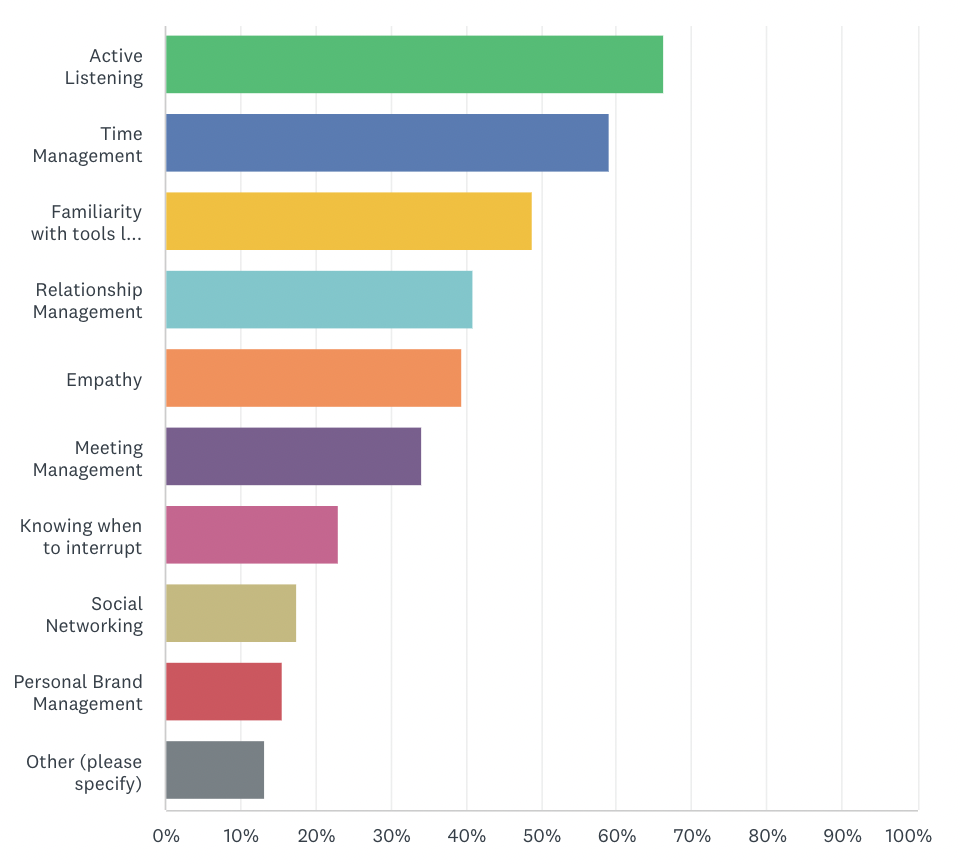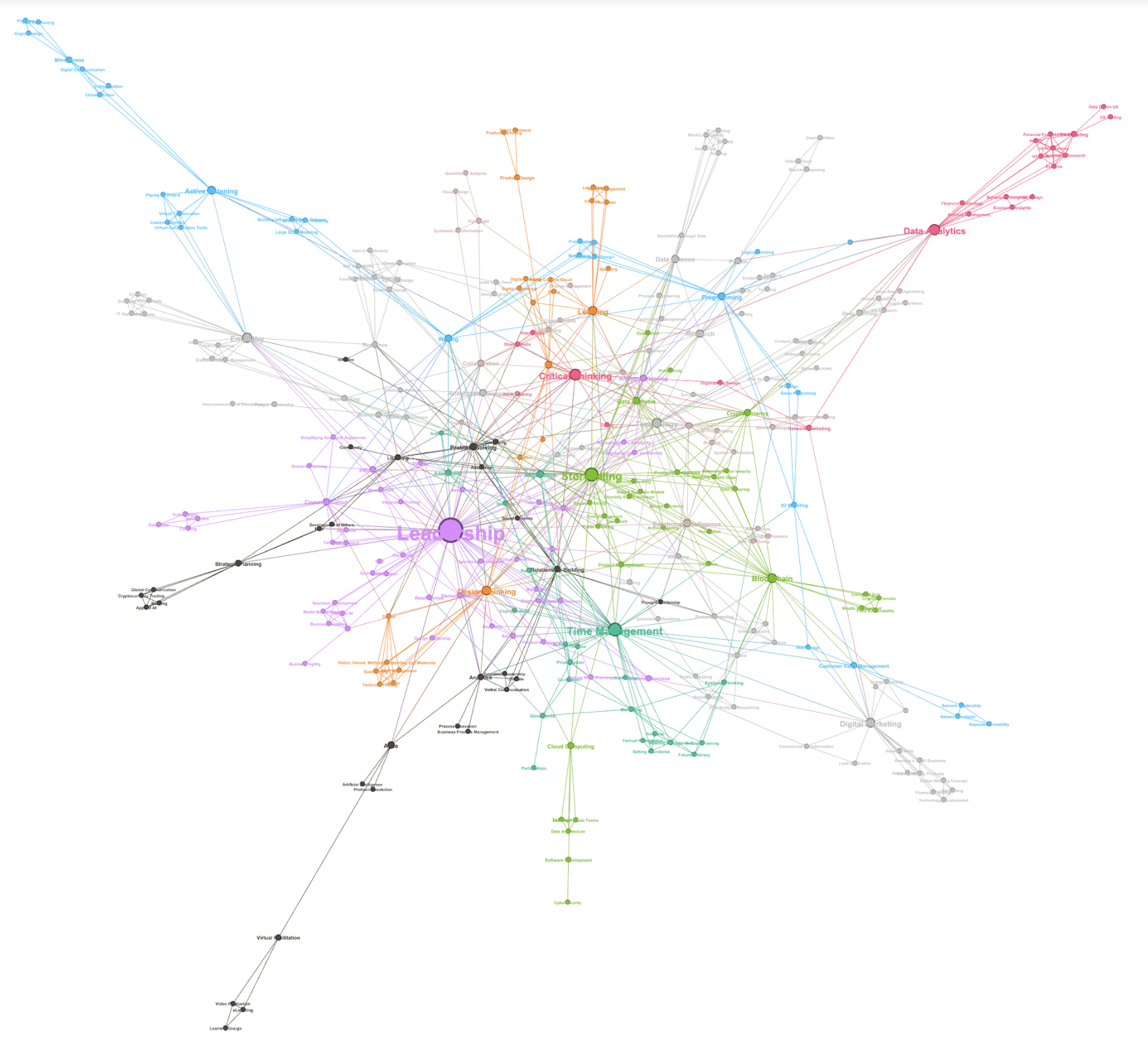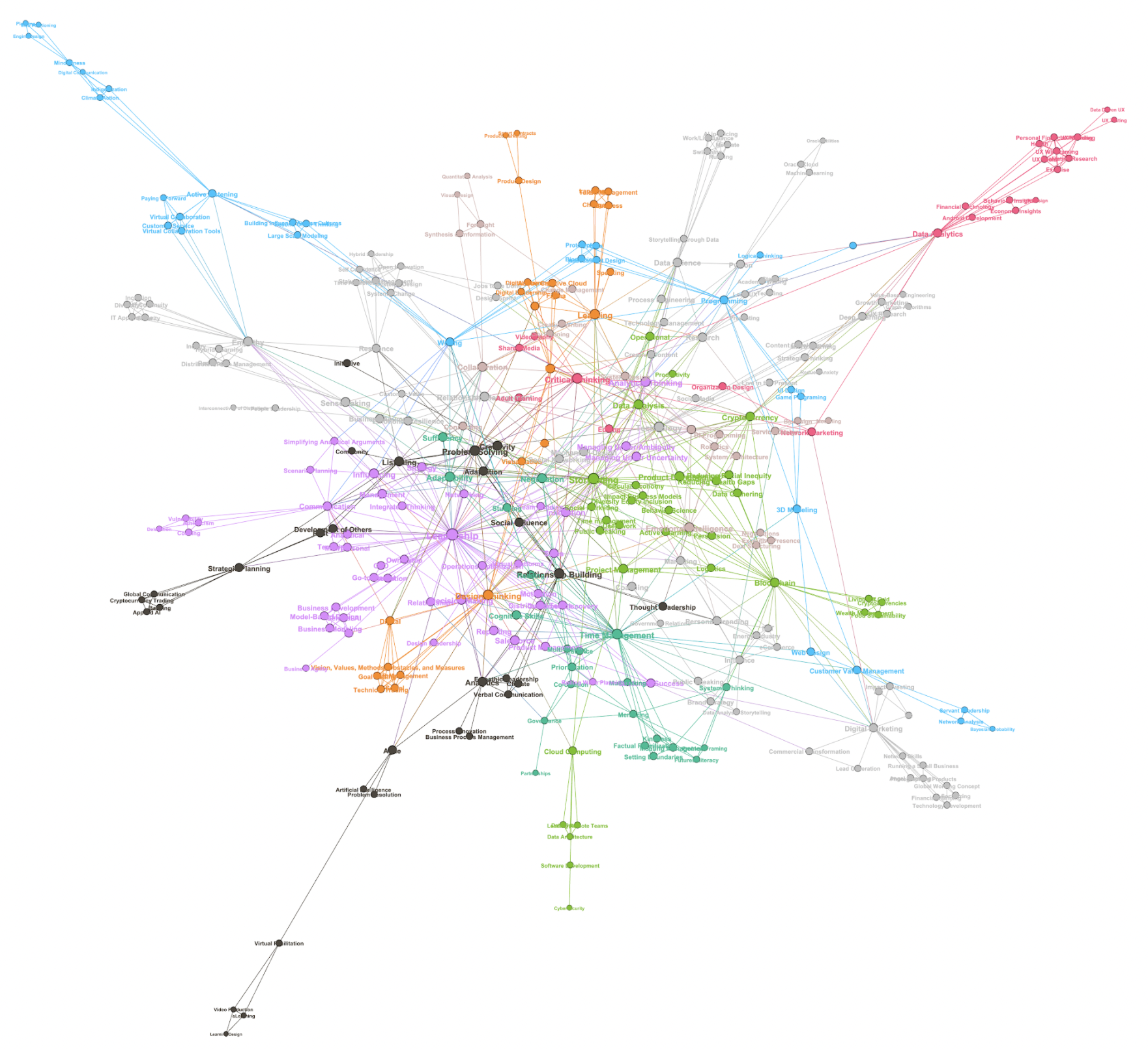Critical Skills for 2022 - First Impressions of Survey Results
Steven Forth is co-founder and managing partner at Ibbaka. See his skill profile here.
At Ibbaka we conduct occasional surveys on critical skills. This complements our other research in this area and can open new windows into how people are thinking about their own skills and the context in which they are applied.
The most recent survey was conducted in December 2021 and January 2022. It drew more than 200 responses from around the world from a diverse set of people. It skews somewhat to people in technology, consulting and design as that is the world we are most connected to.
We are currently deep in analysis of the data and this will take a few more weeks. Each time we do this research we investigate new ways to look for patterns in the data. Given the lag, and our promise to share the results quickly, this post covers some top level findings. It will be replaced by the full report in a few weeks.
We are not the only people digging into critical skills, so we also at other research that has been published recently to compare our results. The most interesting of these comes from EMSI | Burning Glass. It is based on jobs data and reflects the top skills found on job boards. The full report is worth reading: 2022 Talent Playbook.
Comparing the company and individual perspectives on critical skills
The EMSI | Burning Glass gives a corporate perspective while the Ibbaka survey is from the personal perspective, making it interesting to compare them.
I was surprised to see Companionship on the top of the corporate list, but reading the notes showed that this is also referred to as Caregiving. It refers to the growing need for caregivers in healthcare and related professions. This says something about the future of the economy!
There is surprisingly little overlap. In some cases this is because the companies (hiring managers) are more precise. Tensorflow is a popular way to develop AI and Deep Learning applications. Looker, DataDog and Power BI are all data analysis tools. This makes sense as hiring managers are often looking for very specific skills while individuals are more concerned with developing broad competencies. That is generally how I approach my own learning and development. Ibbaka’s skill categorization system differentiates tools and technologies. Good technologists (and designers) understand the difference between a technical skill and the tools used with that skill.
Companies seem to be looking more for people who are self motivated and self directed. This is actually one of our filters at Ibbaka. We are a small agile team and need people who will take leadership over their own work. With more and more remote and hybrid work the ability to manage oneself has become more important.
People, on the other hand, seem to be more concerned with empathy and relationships. That also makes sense. As a person I am more concerned with my relationships with others than being self directed. The Pandemic experiences of the past two years have reinforced our need for relationships and underlined the importance of investing and managing them.
My impression is that the personal skills are more future looking than the company skills. For example, xR (which covers Virtual Reality, Augmented Reality, Mixed Reality, Consensual Reality and so one) is going to be important and is a key skill set for the metaverse. The metaverse also shows up in the long tail of personal skills. The 211 people in the Ibbaka survey identified 408 different skills. There is a wonderful variety of aspiration apparent in the long tail skills.
People want to develop their storytelling and leadership skills
Leadership
It is interesting that Leadership is the top skill in the Ibbaka survey. I would not have predicted this and I reached out to several people to ask about this.
Unfolding this people talked about two things. For some people leadership meant self leadership, the ability to take control over their own lives and direct their own careers. This is a surprising (to me anyway) connection back to what companies are looking for when they ask for Self Starters and Self Motivated people.
The other comment that people made is that anyone in an organization can be, and is expected be, a leader in their own area of responsibility. With so much work being done in teams, often only loosely connected to formal hierarchies, team leadership becomes important. And depending on the work being done, almost anyone on a team can step up and be a team leader.
Looking deep into the long tail skills, one finds other related skills: Thought Leadership, Team Coaching, Servant Leadership.
Storytelling
I was also surprised that Storytelling was so prominent. I do not doubt the importance of storytelling to help us make sense of a fluid and ambiguous world. Looking at the long-tail skills one also finds people calling out things like Storytelling with Data and Visual Storytelling.
Storytelling connects to important skills like Sensemaking which are part of modern leadership. Deborah Ancona at MIT has called this out in her important work on Leadership in an Age of Uncertainty. Her leadership model is shown below.
Other important skills, such as Communication depend on Storytelling and many of the applications of xR involve storytelling.
Earlier in 2021 job site Indeed even published an article 11 Storytelling Skills for Business Success.
Time Management
Time Management was the third core skill that people called out. I believe this is also a response to people working at home during the pandemic. For more on this see below, Skills for Virtual and Distributed Work. Another factor in this may be the growing importance of team based work. Many of us work on multiple teams rather than in a rigid hierarchy or on just one team. Managing all of the conflicting demands on our time, setting priorities and maintaining a work/life balance all require good time management.
Music Sports and Cooking
One of the delights of reviewing the data from this survey was the way people called out specific skills around music, sports and cooking. A number of people reserved at least one slot in their core skills list for their passions. In music people mentioned learning to play the piano, guitar and choral singing. Running, cycling and swimming were the most popular sports. All individual sports, also a Pandemic artifact? Cooking was also a popular core skill. I was hoping to see gardening on this list, but no one mentioned it.
Unpacking the World Economic Forum List of Critical Skills
The World Economic Forum (WEF) also does important work on critical skills. See These are the top 10 job skills of tomorrow – and how long it takes to learn them. The WF top ten skills list often combines different skills into one, so for the Ibbaka survey we unpacked these into their individual components and added a few examples from the Ibbaka Skill Graph. Here is the list we used in the survey.
There are several ways to organize these results.
One can ask which are the most important using the weighted average. The top ten are shown below.
Or one can ask which are essential. Again only the top ten are listed. This changes the order a bit but does not really impact the top ten. (In the report we will share all of the data.)
It is interesting to see Adaptation and Resilience come out so high in this list. There is an emerging understanding that organizations cycle though Resilience Adaptation and Efficiency and there are differences in the skills required in each of these modes.
See Managing the tension between adaptation resilience and efficiency - how skill models evolve.
Skills for Virtual and Distributed Work
Given the times, we also wanted to ask about the skills needed for virtual and distributed work. Here the top skills were Active Listening, Time Management, Familiarity with Tools, Relationship Management and Empathy.
How Skills Connect (Skill Betweenness and Skill Closeness)
Ibbaka’s skill management platform is built on a skill graph. A skill graph treats each skill as a node in a graph and then looks at various connections between skills. In the full Ibbaka skill graph other nodes are things like people, jobs, roles, teams and goals. We regularly share ideas on the skill graph.
In exploring the results of this survey we looked at the betweenness and the closeness of each skill. We also used a social networking algorithm to find clusters of skills. We do this to better understand the connections between skills, both in terms of a person’s aspirations (if they want to develop one skill what other skills do they want to develop) and how skills connect to each other. The connections between skills help us understand the meaning of higher level skills (like Leadership) and how people understand, develop and apply a particular skill.
Betweenness looks at the skills that connect other skills. A skill scores high on betweenness if it is on the path between two other skills. Not surprisingly, Leadership had the highest centrality. Storytelling, Critical Thinking and Time Management also have high betweenness. In the formal report we will pull out the clusters for each skill with high betweenness to see how people are associating different target skills.
Closeness is based on the sum of the length of the shortest paths between the node and all other nodes in the graph. Here no one skill clearly dominates, but it will be interesting to compare the betweenness and centrality clusters.
For more information on measures of network (or graph) centrality in skill management see Network centrality and shared skills.
This is just a taste of what we are finding in the Critical Skills for 2022 survey. The full report will also cover
Key frameworks that will be used to organize and execute work
Technical disciplines that are growing in importance
The relative importance of each of the seventeen UN Sustainable Development Goals (SDGs)
Global trends impacting future skills
Sound interesting? You can sign up for the report here. Please mention ‘Critical Skills for 2022’ in the ask a question field.
Our next survey is on What is the value of skill data to your organization?
Ibbaka posts on critical skills
Critical Skills for 2022 - First Impressions of Survey Results (this post)
Critical Skills - Generative Thinking (Interview with GK VanPatter)
Critical Skills for the Future of Work - Managing Trade Offs
Critical Skills for the Future of Work - What are the Critical Skills?







